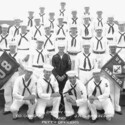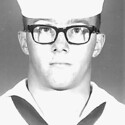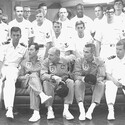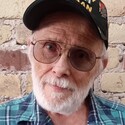Veterans Day: War, astronauts and big blasts ... Navy vet saw a lot during his service
November 10, 2023
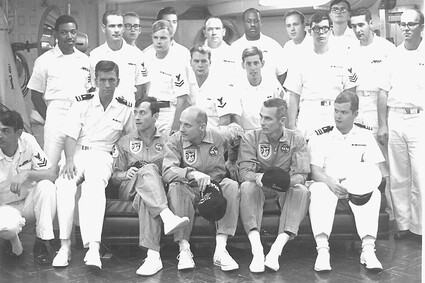
Jerry Tschida, standing at far right, joined shipmates on the USS Princeton for a photo with Apollo 10 astronauts John Young, Tom Stafford and Gene Cernan, who remains the last man to have walked on the moon, during the Apollo 17 mission.
It may seem odd for a Vietnam War era military veteran to refer to his experiences as "fun," but that's how Jerry Tschida chooses to remember his time in the U.S. Navy from 1966 to 1969. It was certainly interesting, including trips aboard the USS Princeton to snatch astronauts from the sea and feeling the aftershock of a historic nuclear warhead test off an island in Alaska's Aleutian chain.
But there are darker memories that bubbled up later in life. At age 35, he was diagnosed with post traumatic stress disorder, something his wife, Renee, was likely well aware of, he said. He came out of the Navy a more mature person, he said, but "things weren't always good. Besides all the fun, there was the time off the coast of Vietnam, the wounded and the dead."
He relished time off in the Philippines or in Singapore after six to seven weeks in the war zone.
"The PTSD didn't show up until after we were married."
It didn't help that he was working in a medical field after his Navy time where he saw lots of trauma. "I've seen plenty of stuff in civilian life, too," he said.
When Tschida returned to Minnesota, after immediately buying a car and a snowmobile, he went to work as a lab technician at Mercy Hospital in his hometown of Moose Lake. It's where he met Renee. He went to nursing school and eventually worked in an intensive care unit in Duluth.
He grew wary of trauma care and, for the last 17 years of his career, worked in the recovery room. He retired at age 52, in part due to some injuries.
"I'm 25 years retired," he said with obvious relish. "I do what I want to do."
Escape
Tschida graduated from Moose Lake High School in 1964. Rather than wait for his draft number to be called, he signed up for the Navy Reserve in 1965, then the regular Navy the next year. He was 19 when he went to boot camp and eventually corps school in San Diego before going aboard the Princeton, an amphibious assault ship with medical facilities carrying helicopters and Marines.
"I had to get out of here," he said of his decision to enlist. There were girlfriend problems, an accident at work, a car accident. It was time for something else, he said. "Time to shape up or ship out."
In the first few years in the Navy he drove ambulance, worked for a hematologist and eventually became a Hospital Corpsman Second Class. He found himself on the Princeton and off the coast of Vietnam in June of 1968. He was learning how to be a lab technician on the fly. The ship returned stateside by the end of the year.
Splashdown
The next mission came in May of 1969. A month before, he and his shipmates learned that they would be going below the equator, east of American Samoa, to recover the astronauts returning from the Apollo 10 mission. It was the last dry run for the Apollo program before the moon landing in July.
Tschida still revels in the history he became a part of. He has pictures and artifacts he's shared with his children and grandchildren, and they, in turn, have used his story for show-and-tell days.
"Not everybody knows someone who picked up astronauts," he said.
He got to poke his head into the command module, remembering a sea of controls. In one picture, Tschida stands with crew members aboard the Princeton with astronauts John Young, Tom Stafford and Gene Cernan, who remains the last man to have walked on the moon, during the Apollo 17 mission.
He laughs about life aboard a Navy ship, full of pranks, initiations and "salty" language. He said a film crew from ABC television was on the ship with the astronauts but likely never aired its footage because of "too much bad language" recorded.
He remembers spending just one Christmas on duty. There were visits to the San Diego Zoo, camping trips to the desert and shooting guns and drinking lots of beer.
Coda
The days were numbered for the Princeton. Built in 1945 during World War II, it was to be scrapped in 1970. Tschida's four-year stint was thus cut short by nearly half a year. But there was one last mission for the ship, a trip to Amchitka, an island in the Aleutian chain of Alaska. The ship was sent to support a second nuclear warhead test there in October of 1969.
In 1965, the Department of Defense drilled a deep hole in the island and set off an 80-kiloton nuclear blast to determine seismologists' ability to detect bombs other countries might be setting off underground.
Four years later, the Atomic Energy Commission used Amchitka for a calibration test. It wanted to observe how a larger underground explosion might damage the island, trigger seismic activity, or generate tsunamis. Workers drilled a 4,000-foot hole, and on Oct. 2, 1969, detonated the second explosion underneath Amchitka.
"We were told we wouldn't see it or feel it," he said. Despite being offshore, the crew on the Princeton certainly "felt it and heard it," Tschida said.
There was another test in 1971. They remain some of the largest bombing tests ever conducted; the third was 385 times more powerful than the bomb dropped on Hiroshima at the end of World War II.
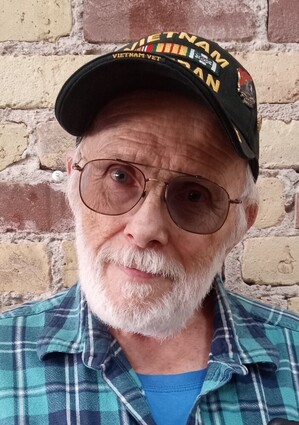
Jerry Tschida grew up in Moose Lake and enlisted in the Navy in 1966 at age 19, serving through 1969. Today he lives in Wrenshall.
By the end of 1969, Tschida was home in Moose Lake, ready for his next chapter. He met Renee, they had two kids, settled in Wrenshall, on land that goes back generations in the family, to the founding family of Habheggers and the town's brickmaking heyday.
When one tells Tschida to have a good day, he has a ready answer. "That's every day," he said.
He realizes he was a lucky one in an often painful era in American military history.
Moving through the corpsman ranks came fast during the Vietnam War, he said, because "they got killed in the war zone. I skated through there."
He pauses, and returns to his hard position on his service time.
"I enjoyed it."
This story was part of a special Veterans Day section inserted in this week's Pine Knot News. Online-only subscribers can click on "View PDF" option on the home page to read that section, which follows page 20 of the regular newspaper.

